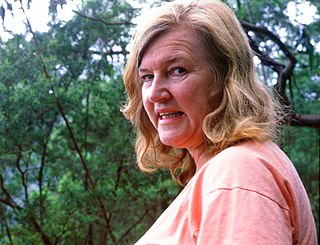A Quote by Eckhart Tolle
But it is important to realize we are all trapped in mental constructs, and so we separate ourselves from reality; the whole world loses its aliveness-or, rather, we lose our ability to sense that aliveness, the sacredness of nature. When we approach nature through the conceptualizing mind, we see a forest as a commodity, a concept. We no longer see it for what it truly is, but for what we want to use it as. It is reduced. This is how it becomes possible for humans to destroy the planet without realizing what they are doing.
Quote Topics
Related Quotes
The answer to the nature of our existence is somewhere in the middle, and that, of course, is what we're looking for: how to see ourselves in a new picture of ourselves and understand the questions that humans have asked forever, "Who are we, how did we get here, where are we going, and what's the nature of this reality that we're in?"
To the extent that we hyper-separate ourselves from nature and reduce it conceptually in order to justify domination, we not only lose the ability to empathise and to see the non-human sphere in ethical terms, but also get a false sense of our own character and location that includes an illusory sense of autonomy. The failure to see the non-human domain in the richer terms appropriate to ethics licences supposedly ‘purely instrumental’ relationships that distort our perceptions and enframings, impoverish our relations and make us insensitive to dependencies and interconnections
Perhaps we all lose our sense of reality to the precise degree to which we are engrossed in our own work, and perhaps that is why we see in the increasing complexity of our mental constructs a means for greater understanding, even while intuitively we know that we shall never be able to fathom the imponderables that govern our course through life.
He will see himself and life and the world as truly as our human limitations will permit; realizing the brevity and minuteness of human life, he will realize also that in individual minds is concentrated whatever of value the known universe contains. And he will see that the man whose mind mirrors the world becomes in a sense as great as the world. In emancipation from the fears that beset the slave of circumstance he will experience a profound joy, and through all the vicissitudes of his outward life he will remain in the depths of his being a happy man.
Kant, discussing the various modes of perception by which the human mind apprehends nature, concluded that it is specially prone to see nature through mathematical spectacles. Just as a man wearing blue spectacles would see only a blue world, so Kant thought that, with our mental bias, we tend to see only a mathematical world.
Without perceiving things through the old filter of past conditioning and conceptualization, one can sense the universe is intensely alive. Even so-called inanimate objects - I often pick up little objects and just look at them and sense that they are alive. Physicists actually confirm that what we perceive as dead matter is not dead at all. Everything is an intensely alive energy field. That aliveness is only an aspect of the aliveness or life that I am.
The romantic view of the natural world as a blissful Eden is only held by people who have no actual experience of nature. People who live in nature are not romantic about it at all. They may hold spiritual beliefs about the world around them, they may have a sense of the unity of nature or the aliveness of all things, but they still kill the animals and uproot the plants in order to eat, to live. If they don't, they will die.
Looking around the world at these wildlife, it's abundantly clear that humans have benefited from nature in so many ways but have also brought many species to the brink of extinction...The American people that I interact with through my IS Foundation work do not want to allow this to happen; they do not want to let these species go without a fight; and they see the way in which nature provides for people around the world.
Seeing the world anew, as if it were new, is as old as writing. It's what all painters are trying to do, to see what's there, to see it in a way that renews it. It becomes more and more urgent as the planet gets worn flat and forest after forest is slain to print the paper for people's impressions to be scrawled down on. It becomes harder and harder to be original, to see things with an innocent eye. Innocence is much tied up with it. As the planet gets progressively less innocent, you need a more innocent eye to see it.
Shallow ecology is anthropocentric, or human-centred. It views humans as above or outside nature, as the source of all value, and ascribes only instrumental, or 'use', value to nature. Deep ecology does not separate humans - or anything else - from the natural environment. It does see the world not as a collection of isolated objects but as a network of phenomena that are fundamentally interconnected and interdependent. Deep ecology recognizes the intrinsic value of all human beings and views humans as just one particular strand in the web of life.
I think it's possible for me to approach the whole problem with a broader scope.When you look at something through an, an organizational eye, whether it's a, a religious organization, political organization, or a civic organization, if you look at it only through the eye of that organization, you see what the organization wants you to see. But you lose your ability to be objective.

































